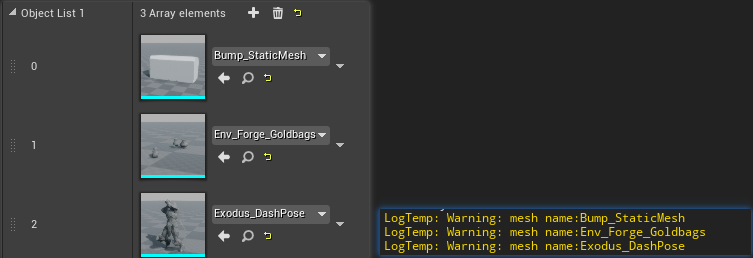【UE4 C++ 基础知识】<11>资源的同步加载与异步加载
同步加载
同步加载会造成进程阻塞。
FObjectFinder / FClassFinder
在构造函数加载
- ConstructorHelpers::FObjectFinder
- ConstructorHelpers::FClassFinder
参考 【UE4 C++ 基础知识】<10>资源的引用
LoadObject
- 一般用来加载资源对象
UMaterial* M_Cube = LoadObject<UMaterial>(nullptr, TEXT("Material'/Game/Geometry/Meshes/CubeMaterial.CubeMaterial'"));
if (M_Cube)
{
UE_LOG(LogTemp, Warning, TEXT("Material name:%s"), *M_Cube->GetName());
}
- 早期版本
StaticLoadObject(),本处只作为记录,推荐使用 LoadObject
soundCue = Cast<USoundCue>(StaticLoadObject(USoundCue::StaticClass(), nullptr, TEXT("SoundCue'/Game/Demo_Drone/Sound/explore_Cue.explore_Cue'")));
UGameplayStatics::PlaySoundAtLocation(this, soundCue,SweepResult.Location);
LoadClass
- 一般用来加载蓝图类, UClass*
- 蓝图类的路径末尾加上
_C
UClass* pClass = LoadClass<AActor>(nullptr, TEXT("Blueprint'/Game/CPPFunction/Load/BP_LoadActor.BP_LoadActor_C'"));
if (pClass)
{
UE_LOG(LogTemp, Warning, TEXT("pClass name:%s"), *pClass->GetName());
}
TSubclassOf<AActor> BPClass = LoadClass<AActor>(nullptr, TEXT("Blueprint'/Game/CPPFunction/Load/BP_MyActor'"));
if (BPClass)
{
UE_LOG(LogTemp, Warning, TEXT("BPClass name:%s"), *BPClass->GetName());
}
TryLoad
- 配合 FSoftObjectPath 使用
- TryLoad 中调用 LoadObject,加载时需要调用Cast转换一下
FSoftObjectPath SoftObjectPaths_Mesh = FSoftObjectPath(TEXT("StaticMesh'/Game/CPPFunction/Load/StaticMesh.StaticMesh'"));
UStaticMesh* Mesh1 = Cast<UStaticMesh>(SoftObjectPaths_Mesh.TryLoad());
if (Mesh1)
{
UE_LOG(LogTemp, Warning, TEXT("Mesh1 name:%s"), *Mesh1->GetName());
}
TryLoadClass
- 搭配 FSoftClassPath 使用
- TryLoadClass 中调用了 LoadClass
FSoftClassPath SoftClassPath_Actor = FSoftClassPath(TEXT("Blueprint'/Game/CPPFunction/Load/BP_MyActor_SoftRef.BP_MyActor_SoftRef_C'"));
UClass* pClass_Actor = SoftClassPath_Actor.TryLoadClass<AActor>();
if (pClass_Actor)
{
UE_LOG(LogTemp, Warning, TEXT("pClass_Actor name:%s"), *pClass_Actor->GetName());
}
FStreamableManager::LoadSynchronous
- FStreamableManager::内部调用 RequestSyncLoad
- 参数中返回一个FStreamableHandle类型的指针
可加载非蓝图资源类
- 配合FStreamableManager、FSoftObjectPath 使用
- 配合FStreamableManager、TSoftObjectPtr
使用
// 配合 FSoftObjectPath 使用 方法一
FSoftObjectPath SoftObjectPaths_Mesh1 = FSoftObjectPath(TEXT("StaticMesh'/Game/CPPFunction/Load/StaticMesh.StaticMesh'"));
UStaticMesh* StaticMesh1 = UAssetManager::GetStreamableManager().LoadSynchronous<UStaticMesh>(SoftObjectPaths_Mesh1);
if (StaticMesh1)
{
UE_LOG(LogTemp, Warning, TEXT("Mesh1 name:%s"), *StaticMesh1->GetName());
}
// 配合 FSoftObjectPath 使用 方法二
FStreamableManager& streamableManager = UAssetManager::GetStreamableManager();
FSoftObjectPath SoftObjectPaths_Mesh2 = FSoftObjectPath(TEXT("StaticMesh'/Game/CPPFunction/Load/StaticMesh_Soft.StaticMesh_Soft'"));
UStaticMesh* StaticMesh2 = streamableManager.LoadSynchronous<UStaticMesh>(SoftObjectPaths_Mesh2);
if (StaticMesh2)
{
UE_LOG(LogTemp, Warning, TEXT("Mesh2 name:%s"), *StaticMesh2->GetName());
}
// 配合 TSoftObjectPtr<T> 使用
FSoftObjectPath SoftObjectPaths_Mesh3 = FSoftObjectPath(TEXT("StaticMesh'/Game/CPPFunction/Load/StaticMesh_Soft2.StaticMesh_Soft2'"));
TSoftObjectPtr<UStaticMesh> SoftObjectPtr_Mesh = TSoftObjectPtr<UStaticMesh>(SoftObjectPaths_Mesh3);
UStaticMesh* StaticMesh3 = streamableManager.LoadSynchronous(SoftObjectPtr_Mesh);//保持良好习惯<UStaticMesh>
if (StaticMesh3)
{
UE_LOG(LogTemp, Warning, TEXT("Mesh3 name:%s"), *StaticMesh3->GetName());
}
也可加载蓝图类为 UClass*
- 配合FStreamableManager、TSoftObjectPtr
使用 - 配合FStreamableManager、TSoftClassPtr
使用
FSoftObjectPath SoftObjectPaths_Actor1 = FSoftObjectPath(TEXT("Blueprint'/Game/CPPFunction/Load/BP_MyActor.BP_MyActor_C'"));
UClass* BPClass1 = UAssetManager::GetStreamableManager().LoadSynchronous<UClass>(SoftObjectPaths_Actor1);
if (BPClass1)
{
UE_LOG(LogTemp, Warning, TEXT("BPClass1 name:%s"), *BPClass1->GetName());
}
// 配合 FSoftObjectPath 使用 方法二
FStreamableManager& streamableManager = UAssetManager::GetStreamableManager();
FSoftObjectPath SoftObjectPaths_Actor2 = FSoftObjectPath(TEXT("Blueprint'/Game/CPPFunction/Load/BP_MyActor_SoftRef.BP_MyActor_SoftRef_C'"));
UClass* BPClass2 = streamableManager.LoadSynchronous<UClass>(SoftObjectPaths_Actor2);
if (BPClass2)
{
UE_LOG(LogTemp, Warning, TEXT("BPClass2 name:%s"), *BPClass2->GetName());
}
// 配合 TSoftObjectPtr<T> 使用
FSoftObjectPath SoftObjectPaths_Actor3 = FSoftObjectPath(TEXT("Blueprint'/Game/CPPFunction/Load/BP_MyActor_SoftRef2.BP_MyActor_SoftRef2_C'"));
TSoftObjectPtr<UClass> SoftObjectPtr_Actor = TSoftObjectPtr<UClass>(SoftObjectPaths_Actor3);
UClass* BPClass3 = streamableManager.LoadSynchronous(SoftObjectPtr_Actor); //保持良好习惯可添加<UClass>
if (BPClass3)
{
UE_LOG(LogTemp, Warning, TEXT("BPClass3 name:%s"), *BPClass3->GetName());
}
FStreamableManager::RequestSyncLoad
- 配合 FStreamableManager、FSoftObjectPath 使用
- 返回一个FStreamableHandle类型的指针
- TSharedPtr
通过 GetLoadedAsset() 获取单个资源 - TSharedPtr
通过 GetLoadedAssets() 获取多个资源
// 获取单个资源 方法一
FSoftObjectPath SoftObjectPaths_Mesh1 = FSoftObjectPath(TEXT("StaticMesh'/Game/CPPFunction/Load/StaticMesh.StaticMesh'"));
TSharedPtr<FStreamableHandle> Handle1 = UAssetManager::GetStreamableManager().RequestSyncLoad(SoftObjectPaths_Mesh1);
if (Handle1.IsValid())
{
UStaticMesh* StaticMesh1 = Cast<UStaticMesh>(Handle1->GetLoadedAsset());
UE_LOG(LogTemp, Warning, TEXT("Mesh1 name:%s"), *StaticMesh1->GetName());
}
// 获取单个资源 方法二
FStreamableManager& streamableManager = UAssetManager::GetStreamableManager();
FSoftObjectPath SoftObjectPaths_Mesh2 = FSoftObjectPath(TEXT("StaticMesh'/Game/CPPFunction/Load/StaticMesh_Soft.StaticMesh_Soft'"));
TSharedPtr<FStreamableHandle> Handle2 = streamableManager.RequestSyncLoad(SoftObjectPaths_Mesh2);
if (Handle2.IsValid())
{
UStaticMesh* StaticMesh2 = Cast<UStaticMesh>(Handle2->GetLoadedAsset());
UE_LOG(LogTemp, Warning, TEXT("Mesh1 name:%s"), *StaticMesh2->GetName());
}
// 获取多个资源
TArray<FSoftObjectPath> SoftObjectPaths;
SoftObjectPaths.Add(SoftObjectPaths_Mesh1);
SoftObjectPaths.Add(SoftObjectPaths_Mesh2);
TSharedPtr<FStreamableHandle> Handle3 = streamableManager.RequestSyncLoad(SoftObjectPaths);
{
TArray<UObject*> Objects;
Handle3->GetLoadedAssets(Objects);
for (UObject* item : Objects)
{
UStaticMesh* StaticMesh3 = Cast<UStaticMesh>(item);
UE_LOG(LogTemp, Warning, TEXT("GetLoadedAssets(), item name:%s"), *StaticMesh3->GetName());
}
}
异步加载
- 为了避免阻塞主线程,可以使用异步加载的方式来加载资源
- 异步加载完成后,可以设置回调函数
- 创建
FStreamableManager,建议将它放在某类全局游戏单件对象中,如使用GameSingletonClassName在DefaultEngine.ini中指定的对象
FStreamableManager::RequestAsyncLoad
- 返回一个 FStreamableHandle 类型的指针
异步加载非蓝图类资源 FSoftObjectPath
-
单文件加载
UPROPERTY(EditAnywhere, Category = "SoftObjectPath", meta = (AllowedClasses = "StaticMesh")) FSoftObjectPath SingeleObject; UFUNCTION() void OnSingleAssetLoadFinshed();// 函数内部分语句 FStreamableManager& streamableManager = UAssetManager::GetStreamableManager(); FStreamableDelegate streamableDelegate = FStreamableDelegate::CreateUObject(this, &ALoadActor::OnSingleAssetLoadFinshed); streamableManager.RequestAsyncLoad(SingeleObject, streamableDelegate); // 要回调的函数 void ALoadActor::OnSingleAssetLoadFinshed() { FSoftObjectPtr SoftObjPtr = FSoftObjectPtr(SingeleObject); UStaticMesh* mesh = Cast<UStaticMesh>(SoftObjPtr.Get()); if (mesh) { UE_LOG(LogTemp, Warning, TEXT("mesh name:%s"), *mesh->GetName()); } }
-
多文件加载
-
方法一 配合
FSoftObjectPtr- FSoftObjectPtr是一个结构体,是一种指向UObject的弱指针。无法在蓝图中使用
- TSoftObjectPtr是一个模板类,是通用FSoftObjectPtr的模块化包装器
UPROPERTY(EditAnywhere, Category="SoftObjectPath", meta = (AllowedClasses = "StaticMesh")) TArray<FSoftObjectPath> ObjectList1; UFUNCTION() void OnMultiAssetsLoadFinshed1();// 函数内部分语句 FStreamableManager& streamableManager = UAssetManager::GetStreamableManager(); FStreamableDelegate streamableDelegate = FStreamableDelegate::CreateUObject(this, &ALoadActor::OnMultiAssetsLoadFinshed1); streamableManager.RequestAsyncLoad(ObjectList1, streamableDelegate); // 要回调的函数 void ALoadActor::OnMultiAssetsLoadFinshed1() { for (auto AssetItem : ObjectList1) { FSoftObjectPtr SoftObjPtr = FSoftObjectPtr(AssetItem); //此处也可用 TSoftObjectPtr<T> UStaticMesh* mesh = Cast<UStaticMesh>(SoftObjPtr.Get()); if (mesh) { UE_LOG(LogTemp, Warning, TEXT("mesh name:%s"), *mesh->GetName()); } } }
-
方法二
配合TSoftObjectPtr<T>UPROPERTY(EditAnywhere, Category = "SoftObjectPath") TArray<TSoftObjectPtr<UTexture2D>> ObjectList2; UFUNCTION() void OnMultiAssetsLoadFinshed2();// 函数内部分语句 FStreamableManager& streamableManager = UAssetManager::GetStreamableManager(); FStreamableDelegate streamableDelegate; streamableDelegate.BindUObject(this, &ALoadActor::OnMultiAssetsLoadFinshed2); TArray<FSoftObjectPath> SoftPathList; for (int32 i=0; i<ObjectList2.Num(); i++) { SoftPathList.Add(ObjectList2[i].ToSoftObjectPath()); } streamableManager.RequestAsyncLoad(SoftPathList, streamableDelegate); // 要回调的函数 void ALoadActor::OnMultiAssetsLoadFinshed2() { for (auto AssetItem : ObjectList2) { UTexture2D* ItemTex = AssetItem.Get(); if (ItemTex) { UE_LOG(LogTemp, Warning, TEXT("Texture2D name:%s"), *ItemTex->GetName()); } } }
-
异步加载蓝图类
-
单文件加载 FSoftClassPath 、TSoftClassPtr
- 测试
TArray<FSoftClassPath>加载多个蓝图类编译不通过
UPROPERTY(EditAnywhere, Category = "SoftClassPath", meta = (MetaClass = "Actor")) FSoftClassPath SingleClassPath; UFUNCTION() void OnSingleClassLoadFinshed();// 函数内部分语句 FStreamableManager& streamableManager = UAssetManager::GetStreamableManager(); FStreamableDelegate streamableDelegate = FStreamableDelegate::CreateUObject(this, &ALoadActor::OnSingleClassLoadFinshed); streamableManager.RequestAsyncLoad(SingleClassPath, streamableDelegate); // 函数内部分语句 void ALoadActor::OnSingleClassLoadFinshed() { TSoftClassPtr<AActor> ItemPtr = TSoftClassPtr<AActor>(SingleClassPath); UClass* ItemClass = ItemPtr.Get(); if (ItemClass) { UE_LOG(LogTemp, Warning, TEXT("Actor name:%s"), *ItemClass->GetName()); } }
- 测试
卸载资源
自动回收
- 当对象失去饮用后会被自动释放。
- 在异步回调结束后,对象会被标记可回收,此时使用
ForceGC可销毁对象
手动回收
使用 FStreamableManager::Unload()
- LoadSynchronous()、RequestSyncLoad()、RequestAsyncLoad() 默认bManageActiveHandle 参数为false,表示自动管理内存;当设为true,表示常驻内存直到手动释放
- FStreamableManager::Unload()会Release掉和当前资源相关的所有FStreamableHandle
- 编辑器模式下会一直常驻内存,打包版本中才会生效
FStreamableManager& streamableManager = UAssetManager::GetStreamableManager();
streamableManager.Unload(FSoftObjectPath(AssetPath));
//需要立即回收的话
GEngine->ForceGarbageCollection(true);
//GetWorld()->ForceGarbageCollection(true);
使用 FStreamableHandle::ReleaseHandle()
- 异步加载时,如果资源还没加载完成就执行ReleaseHandle()(假设加载时bManageActiveHandle为true),比如在执行回调函数之前执行ReleaseHandle,那么当资源加载完成后(回调函数执行之后),会自动从内存中回收。不过该对象在回调函数中仍然有效,除非在回调函数内ForceGC。
- 编辑器模式下会一直常驻内存,打包版本中才会生效
TSharedPtr<FStreamableHandle> Handle1 = UAssetManager::GetStreamableManager().RequestSyncLoad(SoftObjectPaths_Mesh1);
Handle1->ReleaseHandle();
使用 ConditionalBeginDestroy()
- 编辑器模式下卸载后,对象从内存中销毁,无法再次Load,需要重启编辑器
UMaterial* M_Cube = LoadObject<UMaterial>(nullptr, TEXT("Material'/Game/Geometry/Meshes/CubeMaterial.CubeMaterial'"));
if (M_Cube)
{
M_Cube->ConditionalBeginDestroy();
M_Cube = nullptr;
GetWorld()->ForceGarbageCollection();
}
参考
作者:砥才人
出处:https://www.cnblogs.com/shiroe
本系列文章为笔者整理原创,只发表在博客园上,欢迎分享本文链接,如需转载,请注明出处!


 浙公网安备 33010602011771号
浙公网安备 33010602011771号